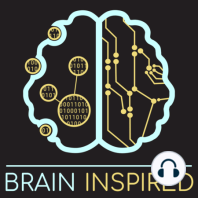43 min listen
BI 138 Matthew Larkum: The Dendrite Hypothesis
FromBrain Inspired
ratings:
Length:
112 minutes
Released:
Jun 6, 2022
Format:
Podcast episode
Description
Check out my free video series about what's missing in AI and Neuroscience
Support the show to get full episodes and join the Discord community.
Matthew Larkum runs his lab at Humboldt University of Berlin, where his group studies how dendrites contribute to computations within and across layers of the neocortex. Since the late 1990s, Matthew has continued to uncover key properties of the way pyramidal neurons stretch across layers of the cortex, their dendrites receiving inputs from those different layers - and thus different brain areas. For example, layer 5 pyramidal neurons have a set of basal dendrites near the cell body that receives feedforward-like input, and a set of apical dendrites all the way up in layer 1 that receives feedback--like input. Depending on which set of dendrites is receiving input, or neither or both, the neuron's output functions in different modes- silent, regular spiking, or burst spiking. Matthew realized the different sets of dendritic inputs could signal different operations, often pairing feedforward sensory--like signals and feedback context-like signals. His research has shown this kind of coincidence detection is important for cognitive functions like perception, memory, learning, and even wakefulness. We discuss many of his ideas and research findings, why dendrites have long been neglected in favor of neuron cell bodies, the possibility of learning about computations by studying implementation-level phenomena, and much more.
Larkum Lab.Twitter: @mattlark.Related papersCellular Mechanisms of Conscious Processing.Perirhinal input to neocortical layer 1 controls learning. (bioRxiv link: https://www.biorxiv.org/content/10.1101/713883v1)Are dendrites conceptually useful?Memories off the top of your head.Do Action Potentials Cause Consciousness?Blake Richard's episode discussing back-propagation in the brain (based on Matthew's experiments)
0:00 - Intro
5:31 - Background: Dendrites
23:20 - Cortical neuron bodies vs. branches
25:47 - Theories of cortex
30:49 - Feedforward and feedback hierarchy
37:40 - Dendritic integration hypothesis
44:32 - DIT vs. other consciousness theories
51:30 - Mac Shine Q1
1:04:38 - Are dendrites conceptually useful?
1:09:15 - Insights from implementation level
1:24:44 - How detailed to model?
1:28:15 - Do action potentials cause consciousness?
1:40:33 - Mac Shine Q2
Support the show to get full episodes and join the Discord community.
Matthew Larkum runs his lab at Humboldt University of Berlin, where his group studies how dendrites contribute to computations within and across layers of the neocortex. Since the late 1990s, Matthew has continued to uncover key properties of the way pyramidal neurons stretch across layers of the cortex, their dendrites receiving inputs from those different layers - and thus different brain areas. For example, layer 5 pyramidal neurons have a set of basal dendrites near the cell body that receives feedforward-like input, and a set of apical dendrites all the way up in layer 1 that receives feedback--like input. Depending on which set of dendrites is receiving input, or neither or both, the neuron's output functions in different modes- silent, regular spiking, or burst spiking. Matthew realized the different sets of dendritic inputs could signal different operations, often pairing feedforward sensory--like signals and feedback context-like signals. His research has shown this kind of coincidence detection is important for cognitive functions like perception, memory, learning, and even wakefulness. We discuss many of his ideas and research findings, why dendrites have long been neglected in favor of neuron cell bodies, the possibility of learning about computations by studying implementation-level phenomena, and much more.
Larkum Lab.Twitter: @mattlark.Related papersCellular Mechanisms of Conscious Processing.Perirhinal input to neocortical layer 1 controls learning. (bioRxiv link: https://www.biorxiv.org/content/10.1101/713883v1)Are dendrites conceptually useful?Memories off the top of your head.Do Action Potentials Cause Consciousness?Blake Richard's episode discussing back-propagation in the brain (based on Matthew's experiments)
0:00 - Intro
5:31 - Background: Dendrites
23:20 - Cortical neuron bodies vs. branches
25:47 - Theories of cortex
30:49 - Feedforward and feedback hierarchy
37:40 - Dendritic integration hypothesis
44:32 - DIT vs. other consciousness theories
51:30 - Mac Shine Q1
1:04:38 - Are dendrites conceptually useful?
1:09:15 - Insights from implementation level
1:24:44 - How detailed to model?
1:28:15 - Do action potentials cause consciousness?
1:40:33 - Mac Shine Q2
Released:
Jun 6, 2022
Format:
Podcast episode
Titles in the series (99)
BI 100.1 Special: What Has Improved Your Career or Well-being?: Brain Inspired turns 100 (episodes) today! To celebrate, my patreon supporters helped me create a list of questions to ask my previous guests, many of whom contributed by answering any or all of the questions. Ive collected all their responses into separ by Brain Inspired
